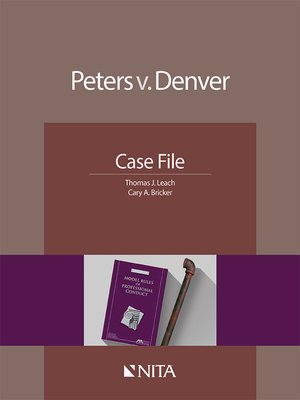
Sign up to save your library
With an OverDrive account, you can save your favorite libraries for at-a-glance information about availability. Find out more about OverDrive accounts.
Find this title in Libby, the library reading app by OverDrive.



Search for a digital library with this title
Title found at these libraries:
| Library Name | Distance |
|---|---|
| Loading... |
Peters v. Denver is a civil action charging legal malpractice on the part of attorney D.C. Denver. Paul Peters was tried and convicted on charges of aggravated battery and attempted murder. Along with his co-defendant, Carl Chastis, Peters was co-represented by Denver the time of their arrest through verdict. Neither defendant testified in the criminal trial. Instead, the defense offered aggressive cross-examination of the State's witnesses (both forensic and fact) and presented two alibi witnesses to testify that during the time period of the crime both Chastis and Peters had been at a social club playing poker. Nevertheless, both men were convicted on all charges and Peters received a prison sentence of life with parole after 20 years.
In this suit Peters charges that Denver provided his defense under an impermissible conflict of interest between his duties to the two criminal defendants, depriving Peters of proper representation and leading to his conviction. Defendant asserts that his conduct of the defense was proper in all respects, and that any conflicts were fully, knowingly, and permissibly waived by plaintiff.
Through the testimony of the parties and expert witnesses and the presentation of exhibits focused on the interaction between Peters and Denver, students will have the opportunity to analyze the duties of attorneys to their clients and pitfalls presented by those duties. This well-balanced case could go either way, and its ethics issues are a subject for challenging questions to witnesses as well as well-reasoned closing arguments.







